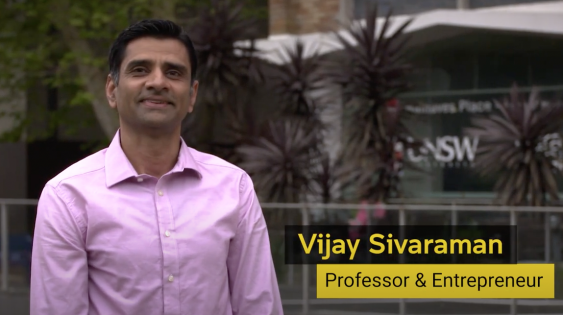UNSW takes top spot for number of new start-ups and spinouts
The spinouts ranked in a national report of public research outcomes include avionics, blockchain and telehealth solution companies.
The spinouts ranked in a national report of public research outcomes include avionics, blockchain and telehealth solution companies.

UNSW Sydney has ranked number one nationally for the greatest number of new start-up and spinout companies founded in 2021 through technology developed at UNSW. The latest Survey of Commercialisation Outcomes from Public Research (SCOPR) Summary Report revealed that UNSW supported 10 spinouts – 14 per cent of the 69 companies established across Australia. This figure is up from five companies in 2020, where UNSW placed an equal third. Of the 10 spinouts, six were founded by UNSW staff members.��
The spinouts established in 2021 include:��
Infinity Avionics provides optical sensors, thermal sensors, and radiation sensors designed for space asset monitoring, space robotics, space-based manufacturing, and earth observation. Infinity Avionics was named the Start-up of the Year in the 2022 Australian Space Awards.��
EnerJin provides hardware and data platforms to enable clients to assess solar energy generation potential in unconventional locations.��
Zyteum is a revolutionary technology company changing the face of Internet of Things (IoT) security and transactions such as distributed supply chain.��
CHELTech develops technology that can provide an efficient and cost-effective way to produce hydrogen from splitting water using renewable energy.����
RadioDynamic Therapeutics commercialises a unique UNSW drug delivery technology where drug release is spatially localised and triggered by light and/or clinical radiation.�� Key applications are in rectal cancer and gene therapies.��
Kandui Technologies manufactures products from waste materials and has partnered with The SMaRT Centre at UNSW, which has developed a series of waste-to-product technologies.����
Vesi Water provides market disruptive, smart and sustainable solutions to the water industry utilising proprietary technology developed in collaboration with UNSW to harvest fresh water from airborne humidity, creating fresh water where none exists.��
LM Plus develops unique liquid metal-based technology that can improve the efficiencies of the electronic and optical-based systems of the future.��
Healthy@91���˰涶�� develops telehealth solutions for chronic condition management including Chronic Obstructive Pulmonary Disease (COPD) heart disease and obesity and has been acquired by medical software company Net-Health.��
“With the establishment of the Staff Spinout Framework, Knowledge Exchange and UNSW Founders have placed a greater focus on nurturing and driving spinout companies, and it’s incredibly exciting to see the strategy creating national and global impact. It’s a testimony to the world leading research, motivated academics and entrepreneurial spirit of the UNSW community,” said Dr Dax Kukulj, Deputy Director of UNSW Knowledge Exchange.����
The Knowledge Exchange team –��part of the Division of Research and Enterprise at UNSW –��supports world-class researchers with translation and engagement with external collaborators from industry, government and the community. It helps drive commercialisation, which is one of the translation pathways to impact. This includes a primary focus on supporting contract and collaborative research, consulting, and commercialising intellectual property (IP), including protecting new technologies and IP developed at UNSW.����
Dr Kukulj said the road to commercialisation can begin with a licence to an established company or through establishing a new spinout or start-up company. “Increasingly, researchers and academics are interested in founding their own companies to drive translation and commercial outcomes,” explained Dr Kukulj.����
Other recent UNSW spinout companies with early success include��Canopus Networks led by Professor Vijay Sivaraman, from the School of Electrical Engineering and Telecommunications, which recently raised $10 million, and Contactile led by Dr Heba Khamis, formerly from the School of Biomedical Engineering, which recently raised $3 million.��
Dr Kukulj says it was an exciting time in the university sector with increased support and focus from the Commonwealth government on commercialisation and translation from universities, as evidenced through the $2.2 billion University Research Commercialisation (URC) Action Plan.����
“This is critical in establishing sovereign capability, the creation of new jobs in Australia-based high-value high-tech industries and future supply chain resilience. I encourage all researchers and academics to consider translation and commercialisation pathways for their research to deliver impact as well as social and economic benefits,” said Dr Kukulj.����
Further information on the is available online and please reach out to if you have a spinout idea you would like to discuss.��

Canopus Networks was established in 2018 to provide telecommunications companies (telcos) visibility into application user experience – for example, if video streams are buffering, games are lagging, and conference calls are glitching.����
“This helps telcos more efficiently tune their multi-billion��network infrastructure to improve user experience, provide better help to users when they seek customer support and create new products for premium gaming and parental monitoring, for example,” explained Professor Vijay Sivaraman, co-founder, Director, and CEO of Canopus Networks.����
“Existing technologies for inspecting network packets are starting to fail as traffic approaches terabit speeds and becomes increasingly encrypted. Canopus has invented and patented a new method that combines programmable network technology with machine learning models to determine application behaviour and user experience accurately and cost-effectively on encrypted traffic at terabit speeds.”
Prof Sivaraman said UNSW Knowledge Exchange helped establish the spinout, set up the legal structures for licensing of intellectual property (IP) and introduced the team to several investors to help secure the seed round of funding.����
“UNSW has also helped Canopus by providing office space and access to labs, while also facilitating research contracts to continue development of new IP.”��
Prof Sivaraman’s advice for entrepreneurs considering working with UNSW Knowledge Exchange is, “Jump in and do it. Once you show leadership and commitment to your cause, others will come in behind you to help and you’ll be amazed at how much help you can get. There is only so much you can plan for beforehand. Have confidence that you will learn to navigate your way through.”��